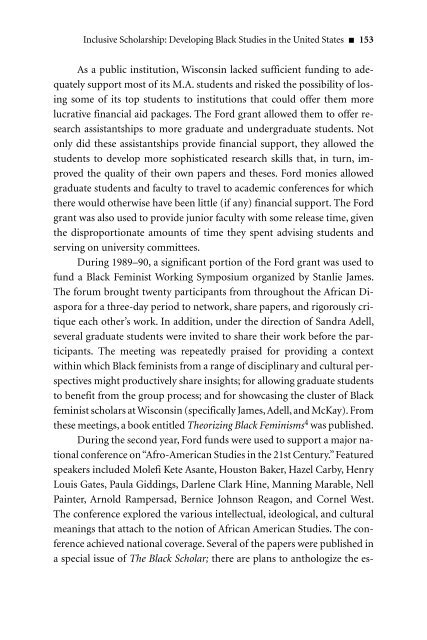Inclusive Scholarship: Developing Black Studies - Ford Foundation
Inclusive Scholarship: Developing Black Studies - Ford Foundation
Inclusive Scholarship: Developing Black Studies - Ford Foundation
Create successful ePaper yourself
Turn your PDF publications into a flip-book with our unique Google optimized e-Paper software.
<strong>Inclusive</strong> <strong>Scholarship</strong>: <strong>Developing</strong> <strong>Black</strong> <strong>Studies</strong> in the United States 153<br />
As a public institution, Wisconsin lacked sufficient funding to adequately<br />
support most of its M.A. students and risked the possibility of losing<br />
some of its top students to institutions that could offer them more<br />
lucrative financial aid packages. The <strong>Ford</strong> grant allowed them to offer research<br />
assistantships to more graduate and undergraduate students. Not<br />
only did these assistantships provide financial support, they allowed the<br />
students to develop more sophisticated research skills that, in turn, improved<br />
the quality of their own papers and theses. <strong>Ford</strong> monies allowed<br />
graduate students and faculty to travel to academic conferences for which<br />
there would otherwise have been little (if any) financial support. The <strong>Ford</strong><br />
grant was also used to provide junior faculty with some release time, given<br />
the disproportionate amounts of time they spent advising students and<br />
serving on university committees.<br />
During 1989–90, a significant portion of the <strong>Ford</strong> grant was used to<br />
fund a <strong>Black</strong> Feminist Working Symposium organized by Stanlie James.<br />
The forum brought twenty participants from throughout the African Diaspora<br />
for a three-day period to network, share papers, and rigorously critique<br />
each other’s work. In addition, under the direction of Sandra Adell,<br />
several graduate students were invited to share their work before the participants.<br />
The meeting was repeatedly praised for providing a context<br />
within which <strong>Black</strong> feminists from a range of disciplinary and cultural perspectives<br />
might productively share insights; for allowing graduate students<br />
to benefit from the group process; and for showcasing the cluster of <strong>Black</strong><br />
feminist scholars at Wisconsin (specifically James,Adell, and McKay). From<br />
these meetings, a book entitled Theorizing <strong>Black</strong> Feminisms 4 was published.<br />
During the second year, <strong>Ford</strong> funds were used to support a major national<br />
conference on“Afro-American <strong>Studies</strong> in the 21st Century.”Featured<br />
speakers included Molefi Kete Asante, Houston Baker, Hazel Carby, Henry<br />
Louis Gates, Paula Giddings, Darlene Clark Hine, Manning Marable, Nell<br />
Painter, Arnold Rampersad, Bernice Johnson Reagon, and Cornel West.<br />
The conference explored the various intellectual, ideological, and cultural<br />
meanings that attach to the notion of African American <strong>Studies</strong>. The conference<br />
achieved national coverage. Several of the papers were published in<br />
a special issue of The <strong>Black</strong> Scholar; there are plans to anthologize the es-

















